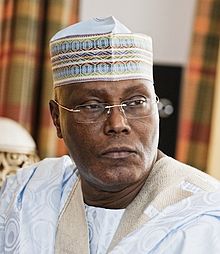…Says Tinubu’s Government Has Taken Nigeria to Its Lowest Democratic Point
By Samuel Ogidan, Abuja
Former Vice President Atiku Abubakar has expressed deep concern over what he described as the steady erosion of Nigeria’s democratic foundations under the administration of President Bola Ahmed Tinubu and the ruling All Progressives Congress (APC).
In his Democracy Day message on Wednesday, Atiku said the sacrifices that brought about the return to civilian rule in 1999 are being reversed by the current government, which he accused of exhibiting authoritarian tendencies and undermining democratic institutions.
“The gains of June 12 were hard-won. But sadly, the democratic promise that blossomed in 1999 is being steadily dismantled before our very eyes,” Atiku stated.
According to the former Vice President, Nigeria now stands at a crossroads, with the ruling party steadily replacing democracy with a “creeping one-party dictatorship.”
“Today, Nigeria teeters on the edge of a dangerous precipice. A creeping one-party dictatorship is replacing the democratic order we bled for. Those who laid down their lives for freedom did not do so for Nigerians to suffer under economic suffocation and political intimidation,” he said.
Atiku accused the APC-led government of consolidating power by silencing opposition voices and weaponizing state institutions.
“The ruling party and its federal government now govern with the unmistakable intent to dominate, subdue, and silence. Their tactics are not subtle. Opposition voices are being systematically erased,” he alleged.
He further criticized the awarding of major government contracts to individuals allegedly linked to the presidency, as well as the renaming of national institutions in honour of President Tinubu.
“Contracts for multi-billion-naira infrastructure projects are funnelled to cronies and family associates of the president. National institutions, once symbols of unity, are being brazenly renamed in honour of a sitting president — as though the country were a private estate,” he said. “What we are witnessing is not governance — it is conquest.”
Describing the current administration as the “lowest ebb” of Nigeria’s democratic journey, Atiku lamented that policies are no longer designed to empower citizens, but rather to instill fear and consolidate elite privilege.
“Institutional integrity has been compromised. The common Nigerian has been abandoned at the altar of elite comfort. And make no mistake: this is the antithesis of everything June 12 stands for,” he declared.
Atiku, a key figure in Nigeria’s democratic history, noted that the country is once again at a critical juncture — one that demands decisive action.
“We must choose: the path of democratic renewal or the dark alley of despotism,” he warned.
In what appeared to be a veiled reference to ongoing efforts to form a coalition ahead of the 2027 general elections, Atiku said the move is driven by moral duty rather than political ambition.
“The ongoing effort to build a broad, united opposition front is not about power for power’s sake. It is a moral imperative. It is about defending the legacy of June 12 and preventing the privatization of the Nigerian state,” he explained.
“This is not just a political contest; it is a moral crusade — a struggle to liberate our economy, our democracy, and our national dignity from the grip of authoritarian forces. And like every righteous struggle, it demands courage, clarity, and collective resolve.”
Atiku emphasized that the spirit of June 12 remains alive as long as injustice and oppression persist. “As long as oppression thrives, June 12 lives on — not just as memory, but as movement. The time to rise is now.”
Reflecting on the sacrifices made in the struggle for democracy, Atiku praised the resilience of the Nigerian people and paid tribute to fallen heroes of the June 12 movement.
“The political class made painful compromises, but it was the Nigerian people who bore the heaviest burden. I, too, made my fair share of sacrifices — notably stepping aside from my presidential ambition in deference to the late Chief MKO Abiola, a gesture made in faith and loyalty to a higher national purpose,” he recounted.
He also honoured the memories of iconic pro-democracy figures who paid the ultimate price: “The late Alhaja Kudirat Abiola, Tafida Shehu Musa Yar’Adua, Alfred Rewane — these brave souls gave their lives in pursuit of a freer Nigeria. Their memories are etched into our national conscience and must never be forgotten.”
As Nigeria marks over three decades since the historic June 12, 1993 election, Atiku’s remarks serve as both a warning and a rallying call to restore democratic ideals and resist authoritarian drift.

